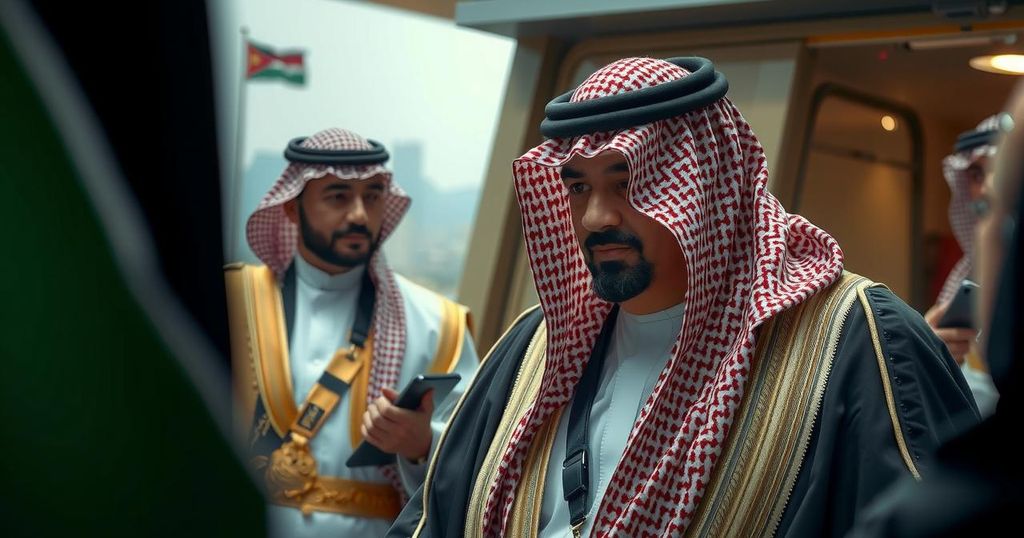King Abdullah of Jordan Commences Official Visit to Saudi Arabia

King Abdullah of Jordan embarked on an official visit to Saudi Arabia, accompanied by Crown Prince Al Hussein. In Riyadh, the Saudi Minister of National Guard engaged with the Uzbek Ambassador on bilateral relations, while the Saudi Food and Drug Authority established a partnership with King Abdulaziz University to foster healthcare innovation. Additionally, the introduction of a Mobile Stroke Unit by King Faisal Specialist Hospital aims to improve medical outcomes for stroke patients by providing immediate treatment during transit.
On Tuesday, King Abdullah of Jordan commenced an official visit to Saudi Arabia, accompanied by Crown Prince Al Hussein bin Abdullah II. During his absence, Prince Ali bin Al Hussein was sworn in as Regent in a ceremony attended by Cabinet members. In Riyadh, Prince Abdullah bin Bandar bin Abdulaziz, the Saudi Minister of National Guard, met with Nodirjon Turgunov, the Uzbek Ambassador to the Kingdom, to discuss bilateral relations and mutual interests. The meeting included several senior officials. This week, officials from the Saudi Food and Drug Authority are participating in their second event aimed at enhancing collaboration in the medical and pharmaceutical sectors. They signed a memorandum of understanding with King Abdulaziz University during the Global Health Exhibition 2024 in Riyadh, which runs until Wednesday. This partnership focuses on various educational and research initiatives, aiming to improve healthcare innovation in Saudi Arabia and empower youth through training opportunities. Additionally, Saudi Defense Minister Prince Khalid bin Salman conversed with British Secretary of State for Defense John Healey regarding their ongoing defense cooperation, emphasizing their strong bilateral relationship amid regional and international issues. In a noteworthy healthcare advancement, King Faisal Specialist Hospital and Research Centre unveiled a new Mobile Stroke Unit during the Global Health Exhibition. This service aims to significantly enhance outcomes for stroke patients by providing medical care directly in transit. The mobile unit is equipped with advanced technology, including CT scan capabilities, which allows for immediate diagnosis and treatment of strokes, addressing critical delays often caused by urban traffic congestion. Notably, KFSHRC is recognized for its pioneering role in medical research, and the introduction of the Mobile Stroke Unit aligns with Saudi Arabia’s Vision 2030 initiatives to improve healthcare services. Stroke is a leading cause of mortality in the Kingdom, and timely intervention can greatly increase recovery rates for patients.
Jordan’s King Abdullah’s official visit to Saudi Arabia is part of a broader trend of diplomatic engagement in the region. The discussions between Saudi and Uzbek officials reflect ongoing efforts to strengthen international relations, particularly amid complex geopolitical dynamics. Furthermore, the Saudi Food and Drug Authority’s collaboration with King Abdulaziz University illustrates the Kingdom’s commitment to advancing healthcare innovation, crucial for addressing public health challenges. The launch of the Mobile Stroke Unit showcases the integration of technology in healthcare, aimed at improving patient outcomes during emergencies. These initiatives align with Saudi Arabia’s Vision 2030, emphasizing the enhancement of healthcare services and infrastructure in the Kingdom.
In conclusion, King Abdullah’s visit to Saudi Arabia underscores the importance of regional diplomacy, while various discussions highlight collaborative efforts across health and defense sectors. The innovative launch of the Mobile Stroke Unit signifies a commitment to improving healthcare delivery, thereby enhancing recovery potential for stroke patients. These developments reflect the evolving landscape of international relations and healthcare innovation in Saudi Arabia.
Original Source: www.arabnews.com







